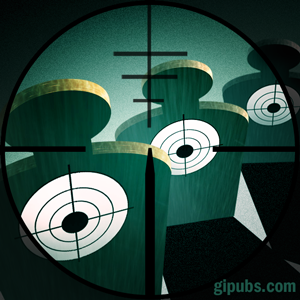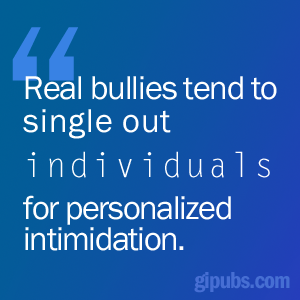Bullying is counter to military values and teamwork. Yet, it is frequently a fact of life in the military. In part, this is because rank gives bullies power over people they outrank. In addition, yelling at people and getting in their face is nothing new in the military. This is why there is often a fine line between motivating subordinates and being a bully.
Example
“Sir, I wanted to let you know that I’ve gotten another complaint about SFC Haun. He’s still getting a little out of control, yelling at his squad leaders, and saying some pretty nasty things about them in front of their troops.”
“Listen, First Sergeant, we’ve got a whole lot on our plate right now. I’ve talked with Haun’s LT and he’s counseled him. Haun gets the job done. His troops are just going to have to get used to him and stop being so damned sensitive! We’ve got a mission here and I don’t have time for more of this,” replied the commander. “What else you got?”
“That’s all, sir.”

"By the time {bullies} join the military, they are no longer amateurs. They know how to spot potential targets... and then capitalize on the sport.
From the commander’s point of view, SFC Haun does his job and he doesn’t give the commander any crap, so from the commander’s perspective this isn’t a big deal. However, if you are on the receiving end of a bully’s rants, it is quite a different matter. The official guidance on dealing with bullies is to report them to your chain of command, who should take action. If that doesn’t produce satisfactory results, present your complaint to the IG. While technically this is correct, as this example shows, it doesn’t always work. It is also likely to label you as a wimp or a troublemaker.
Make a stand
Self defense against bullies is far more effective than the old school rule of tell the teacher. To defend yourself, you must first recognize a bully as a bully. When drill sergeants get in your face and yell at you to keep going and don’t quit, it is not bullying. They are doing their job. Developing a tough skin and focusing on the task at hand are critical skills in the military. Just because someone is rude or abrupt, doesn’t necessarily mean they are a bully. There are, unfortunately, plenty of people who lack tact and polite manners, both in and out of the service.
 Real bullies tend to single out individuals for personalized intimidation. They get their kicks by belittling and intimidating people they see as vulnerable or weak. For bullies, this is their personal sport. By the time they join the military, they are no longer amateurs. They know how to spot potential targets, launch the first probe attack, and then capitalize on the sport. They are also quite skilled at how to play the game if someone reports them. For example, “Sir, I’m just trying to motivate ‘em to do better. They’re taking this way too personally. Sir, I’ve been in the Army for eight years. Trust me. I know how to get the job done.”
Real bullies tend to single out individuals for personalized intimidation. They get their kicks by belittling and intimidating people they see as vulnerable or weak. For bullies, this is their personal sport. By the time they join the military, they are no longer amateurs. They know how to spot potential targets, launch the first probe attack, and then capitalize on the sport. They are also quite skilled at how to play the game if someone reports them. For example, “Sir, I’m just trying to motivate ‘em to do better. They’re taking this way too personally. Sir, I’ve been in the Army for eight years. Trust me. I know how to get the job done.”
Bullies most often target the individual who is different. This may be the new guy or the minority, whether that is a person of a different ethnic or racial group, different gender, or gay or lesbian. They also look for loners and people who work hard to be nice to everyone, avoiding confrontation at all costs. For the record, men don’t have a corner on bullying; women can be bullies, as well.
While the verbal attacks of bullies can be extremely painful, in the beginning bullies are seldom physical, as in pushing or hitting someone. They are testing their target to see how they react. The first time someone bullies you, you could logically ignore it. Maybe they’re just having a bad day. But if they bully you a second time, you have to recognize the behavior for what it is and be prepared to defend yourself. Unfortunately, in the military you can’t get your dukes up, ready to hit them, although this is tempting. If you sense that you are dealing with a bully, you need to plan your strategy and be ready to stand your ground.

"No matter how nasty they may be... Do not back down or apologize."
With rare exceptions, the most important thing is NOT to react to what the bully has said to you. They want to suck you into an encounter which they will invariably control, and they want to see you miserable. No matter how nasty they may be, do not take their comments to heart or dwell on them. Mentally shove their words and gestures straight down the crapper, because that is where they belong. Do not back down or apologize. Saying I’m sorry to a bully is the equivalent of pouring gasoline on a fire. Bullies feed on this. If your lip starts to quiver, or you look down, or worst of all, tears start to roll down your face, you have lost the fight. Don’t waste your time arguing with them or verbally defending yourself at this point. Whatever you say, they will twist to their own devices and fire back at you. Your objective should be to stand your ground and refuse to let them rile you up. By doing this, you deprive them of the satisfaction of jerking you around.
Respectfully refuse to engage
When the bully outranks you, military courtesy still rules. However, you can use this to your advantage. Don’t look away. Instead, look straight at the bully with your eyes locked on their face, as disgusting as he or she may be. If you can’t manage that, focus on something in the distance just over their shoulder. When they say something to you and wait for your response, take a slow breath and then give them a level, clear and unemotional response.
Example
SGT Davidson had singled out SPC Khalid as his latest target for bullying. SPC Kahlid was quiet, a hard worker, and went out of his way to get along with everyone. One evening SGT Davidson got SPC Khalid alone in their housing unit and began interrogating him. “Kahlid, why don’t you ever get your shit in order? You can’t keep your gear clean–you’re a f___in’ ass sorry excuse for a Soldier.”
He was surprised when SPC Kahlid stood up, came to attention and just looked squarely at him. SGT Davidson stepped closer and said, “Did you hear what I said?”
SPC Kahlid said evenly, “Yes, Sergeant!”
To which, SGT Davidson replied, getting even closer, “Who do you think you’re talking to, s___head?”
No matter what he said, to include “You are a flat-out worthless piece of s__t!”, all SPC Kahlid said was “Yes, Sergeant” or “No excuse, Sergeant.” He was pissed, but he sure as hell didn’t want SGT Davidson to know it. SGT Davidson ranted on. When he finally ran out of breath, he turned away from SPC Kahlid in disgust. SPC Kahlid, still standing, said, “Will that be all, SGT?” to which SGT Davidson responded with an obscene gesture. Still standing tall, SPC Kahlid walked outside.

"Your next stage of defense is to keep some distance between yourself and the bully. Be alert to your surroundings. Stick with your teammates or your friends and don’t allow the bully to corner you by yourself.
Refusing to let the bully get your goat should be your first line of defense, even if he outranks you. Practice your hard look. Stare directly at yourself in the mirror with a you can’t upset me look until you can put that face on in an instant. It doesn’t hurt to also rehearse your flat, level responses in advance. You will gain confidence by doing this and you will be ready to stand up to the bully when he or she launches an attack.
Your next stage of defense is to keep some distance between yourself and the bully. Be alert to your surroundings. Stick with your teammates or your friends and don’t allow the bully to corner you by yourself. Bullies, who target individuals, usually don’t want an audience. The exception is with bullies who badger someone in order to show off in front of others, in which case the calm, direct look and you can’t upset me attitude still rules. If the bully gets you alone, be prepared for a verbal attack. Take the initiative to put yourself between him and the exit before he can launch an attack. Don’t wait and hope for them to cool off and be nice. Bullies seldom calm down during a rant. They are getting off by watching your response. As in the previous example, when the opportunity presents itself, beat feet and get the hell out of there. Go where there are other people. Generally a bully will not pursue you and risk having witnesses to his or her behavior. Later they may corner you with, What’s wrong? You too chicken to talk to me? Again, use the direct look and unemotional responses. Sooner or later they will drop the subject, because you are depriving them of what they crave.
Start taking notes
If the bullying persists, start keeping a written record of the dates, times, locations, witnesses if any, and a few key points of what the bully says or does. If his behavior is reported, you will have valuable documentation to support your team members and the chain of command in taking disciplinary action. Not surprisingly, bullies don’t keep records, so your specifics will carry considerable weight.
The personality of a bully doesn’t change. They aren’t beginners at this sport and they will continue to try to intimidate you, until they realize that they are wasting their time, because they can’t get a rise out of you. When you repeatedly refuse to play the game with them, they will move on to someone else. It might seem logical to discuss the bully’s behavior with them. There can be a place for this, but never attempt to talk with them about their behavior while they are in full bully mode. This is the equivalent of trying to reason with someone who is drunk or stoned. Wait until they have cooled off and you have made a written memorandum for record of what happened. Also, consider what your objective is and what you can reasonably expect as an outcome. You can’t modify the basic personality of a bully, particularly if they outrank you. This is who they are and they aren’t likely to change. Especially if you are a junior Soldier or NCO, the bully may take this as an opportunity to give you a little more of their ugly medicine or tell you that you are just imagining things. Sometimes the best thing to do in these situations is nothing.
Do your best to eliminate this behavior
If you are a leader, be on the alert for bullies in your organization. With their experience, they will be careful not to let you see their intimidating behavior. In fact, bullies are often great suck-ups to their bosses in order to gain advance credit in the event something happens and they get caught. When you clearly identify someone who has bullied his or her subordinates, you must make your point in the most assertive manner possible and tell them to Knock this off!! Do you understand? You need to have one or more witnesses to this counseling session and you should document it in a formal counseling statement. Advise your boss of what happened and the action you have taken. Beyond that, be on the alert for indications of future bullying and be prepared to take disciplinary action or recommend it, depending on your position in the organization. An advantage in dealing with bullies in the military is that although you cannot change their personality, you can usually control their behavior while they are under your authority, provided you stick to your guns.
Leaders also have a responsibility to coach their team members on how to recognize bullying behavior and stop it when it starts through self defense. Not everyone has the advantage of growing up in a family where they learn early on how to defend themselves against bullies. Help them to gain confidence by using role playing exercises and open discussions. Individuals who are targeted by a bully need to understand that they are not the problem. Sure, there may be some aspects of their duty performance that need improvement, but this is not justification for a bully attack. Bullying is counterproductive to team cohesion, regardless of where it occurs.
Consider the overall health of the team
Teamwork is the backbone of every good military organization. Look out for the other members of your team, when you know there is a bully around. Protect each other and do not allow the targets of bullies to become isolated. If you witness someone being bullied, have the courage to step in and stop the behavior if you have the rank necessary. To do otherwise, makes you an accessory to the bully, even though that may not be your intention. If you don’t have the rank, don’t leave your teammate alone with the bully if you can help it. Stand by in the area even if the bully tells you to get lost. Listen to what is going on and support your team members. No bully can defeat a determined team.
Bullies are unfortunately a fact of life and their attacks take many forms. To successfully counter a bully, you must stand up for yourself–refuse to allow the bully to intimidate you or suck you into his or her game. Anticipate bullies, prepare for a potential attack, and if it comes, stand your ground. No one else can do this for you. The more often you do it, the easier it will become. The word will also get around that you are a force to be reckoned with, and bullies will leave you alone.













Comments
George
I met a staff sergeant for the US Army via social media, i am a civilian. He wanted to be a part of my life, but it’s hard because he is a victim of identity theft. There are times that he has genuinely bullied me. Made threats to have the local police and FBI come and arrest me in front of my family because I stand up to him. He runs me ragged like I am a soldier, basically treats me like an insubordinate. He has harassed me to the point that he cost me my job, my family’s respect. He goes from Mr Nice Guy to Junior High Buly just like that,
Tom
I remember I was a victim of bullying in basic training, it wasn’t my imagination I was picked on for, islated, and at times brought into the instructors officeand made to speak to entertainhigh ranking oifficials who they brought in because I was 18 and my voice was still high at the time. The problem is if I tried to look them in the eyes they would scream not to “eye ball” them and claimed I was challenging them. They never stopped their attack because when I didn’t give them the reaction they sought I would get smoked and they seem to get their jollies off that. My attempts to complain and even contact my folks at the time got me in further trouble where I was called into meet withall the companies instructors and they basically they had no clue what I was talking about and the events I gave in my records never happened. I was wrote up that day instead in the meeting because I did not do well on my run. I always wondered what else I could have done in that situation.
Part-Time-Commander
Bullying can be a problem in the military. However, I’ve also found that many Soldiers don’t understand that they are in the military, not the civilian world. Many Soldiers are quick to use the term “bullying” or harassment when someone confronts them or tells them to do something, especially if they don’t like what they are being told to do.
Your job as a leader is to set a good example, to enforce the standards to everyone equally, to get things done through other people, and deal with issues as they arise. You also need to keep a close eye on your subordinates to make sure they are doing the same thing with the people they lead.
Mark Gerecht
Nick,
I think that you are talking about a different subject “Corrective Action”. I believe the author is talking about leaders that are clearly power drunk or just get off making life difficult for Soldiers. With that in mind leaders that improperly execute corrective training as you describe can be viewed as bullying, or abusing their subordinates. This is either a true statement or at least a perception based on the action of the leader not the Soldier receiving the corrective action. Taking appropriate action with a substandard subordinate is not bullying or toxic leadership. However the method the leader chooses to correct the substandard performance can be viewed as toxic leadership, bullying, or abuse of subordinate. Corrective action is designed to correct substandard performance and get the Soldier’s attention. Unfortunately some leaders including some senior leaders believe that singling someone out in formation with inappropriate language, brow beating, or smoke sessions is corrective training. This is not corrective training it is inappropriate. Now with that stated we all have a learning curve including me. Many leaders think they are doing the right thing because that’s how they were treated. The goal is to correct the Soldier with a level of professionalism that the Soldier understands the correction learns from it, and most importantly the leader gains respect and loyalty from the Soldier. This is best accomplished by pulling the Soldier aside and correcting the issue. Another way to look at this is to “Praise in Public and chastise in Private”. There will be some Soldier’s that test your patience but they should be the exception. Based on experience I can tell you that treating other people like you want to be treated does nothing but help you improve as a leader and more importantly develops your reputation with your Soldiers as a fair and just leader. If corrective action is done professionally rarely will someone accuse you of toxic leadership, bullying, or abuse of subordinates. With the current environment in the Army and the intense scrutiny on leaders I would encourage all leaders to think before launching on a Soldier. The should also ask themselves a few questions when dealing with Soldiers. (1) Will my actions be viewed by a reasonable person as professional? (2) Are my actions based on fact? (3) Is my action void of emotion? (4) Is my action designed to correct and educate? (5) Will other Soldiers learn from this action? (6) Will my Soldiers view my action as professional or vindictive?
These few simple questions make the difference between a leader that leads by a professional standard and a leader that leads by fear. Don’t be the leader that leads by fear.
On a side note many leaders like to use physical fitness as corrective training. But few understand how to correctly use this tool. I would encourage all leaders to read AR 600-20 and TC 3.22-20 as they relate to this issue. These items have specific guides about using physical fitness as a corrective training method.
Bottom-line: Leaders need to be able to take constructive criticism, and 99% of the time can avoid the perception of toxic leadership, bullying, and abuse of subordinate by just treating Soldier like they want to be treated. I know as a young leader I was fortunate to have a few good senior leaders that corrected me and educated me on how to properly correct Soldiers. I was better for it. We all have room to grow as leaders.
SGT NICK
I do not think you clearly defined what is considered bullying and motivation. If a soldier cannot come to formation on time or cannot complete unit runs of course they are going to be getting some personal attention. Some people might think that the soldier is being singled out, or bullied but with all the hype about toxic leadership I think toxic or substandard soldiers should also be addressed.
Jo B. Rusin
SGT Nick,
You make an excellent point. The difficulties in dealing with substandard soldiers, who resist leaders striving to motivate them to improve, is a real challenge. It’s a subject that I will incorporate into a future AskTop article.
Many thanks for taking time to add this perspective to the discussion and thanks for giving me a good idea for a new article.
Mark Gerecht
SGT Nick,
You might want to check out Jo’s book – Move Out it is available in physical copy and EBook from Gipubs.com I bring this up because the books has some excellent examples and discusses leadership from a perspective not usually addressed. It is one of the best leadership book I have had the opportunity to read. It is also written by a retired COL that has a unique view of leadership based on extensive knowledge and experience that few leaders have. I apologize if this comes across as a hard sell. You seem to be actively involved in leadership issues and I thought you might enjoy the read. Also on a side note I see you have made numerous post to the site sharing your expertise. I greatly appreciate this! It’s always good to see leaders actively involved in a constructive way.
Cheers
TOP